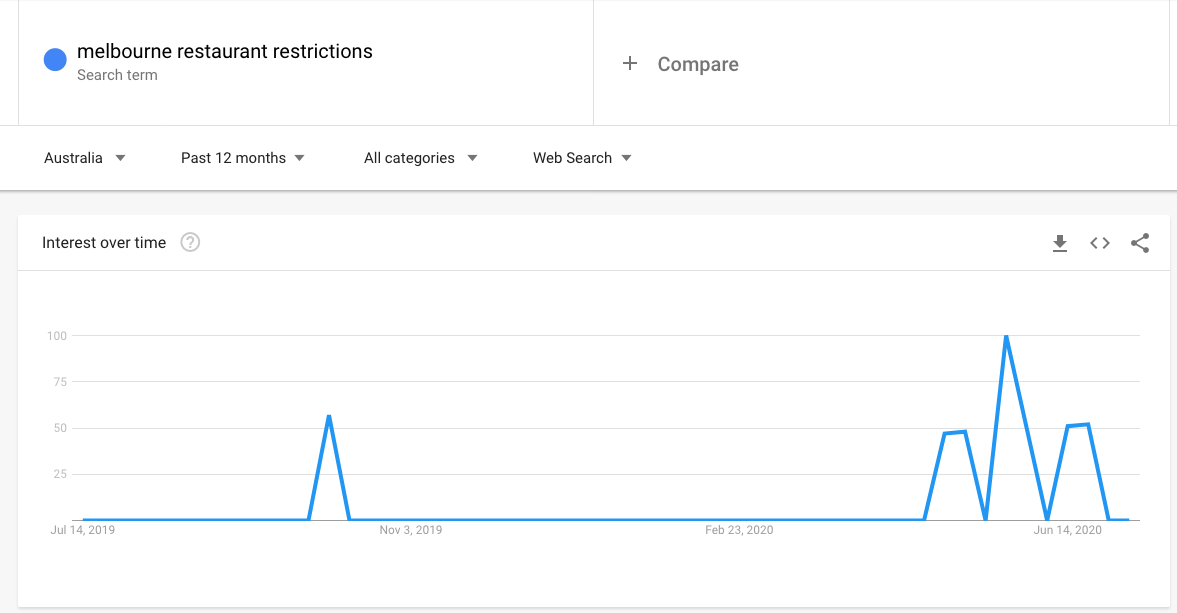Today, 4 out of 5 consumers use search engines to find local information – so it goes without saying that having a strong online presence is key to getting in front of customers.
And with COVID-19 sending more people online and transforming the way customers interact with businesses, there’s never been a better time to take advantage of search marketing to grow your brand.
What is search marketing?
Before we get into the reasons why search will be especially important in the coming months and years, let’s go over the basics. What exactly is search marketing? Simply put, it covers any tactic used to boost online visibility of your brand and drive traffic to your website.
When people talk about search marketing, they’re usually referring to search engine optimisation (SEO) or search engine marketing (SEM). The two are similar, but with a few key differences.
SEO is the practice of optimising your website content and other online pages (such as business listings) to improve your ranking in search engines. The ultimate goal of SEO is to increase your brand’s online visibility – ideally reaching the first page of Google results – and drive more traffic to your website through organic (unpaid) efforts.
SEM typically refers to the process of increasing online visibility and gaining traffic through buying ads on search engines. SEM is often referred to as paid advertising, pay-per-click or ‘paid search.’

Does getting on the first page of Google really matter?
But does that first page ranking really matter? The short answer is, absolutely! Here are three concrete reasons why.
75% of searchers never look past the first page of results.
In other words, your potential customer base shrinks by 75% if you don’t make it to the first page of search results for keywords that are relevant to your business.
If you do make it to page one, your position within the top 10 also affects your click-through rate. For example, the average click-through rate for a spot in position one is 43.32%. This drops to 37.36% for position two and goes on to decrease further until it reaches 3.11% at position 10.
That’s why businesses invest time and resources into not just making it onto the first page, but also gaining a high position on that first page.
When people search for a business, they focus on location.
Google’s research into search behaviour found that 76% of people who search for a business in their area online visit a store within a day, and 28% of local searches result in a purchase.
That’s why it’s especially important to make it to the first page of Google’s results, especially when you have a physical location. This kind of local search also makes it easier to appear on page one, as there are fewer businesses competing in location-based searches.
Ensuring you’re listed on reputable location-specific directories like yellowpages.com.au is a simple way to boost your chances of appearing at the top of location searches.
RELATED: 7 ways to appear in more local searches.
Organic search drives more revenue than paid search.
Organic search results are results on Google that don’t involve you paying for a space on page one.
Google reserves up to four paid spots at the top of page one, which you see marked with a small ‘Ad’ notice next to the result. The rest of the page spots are ‘free’ and also known as organic, which you can’t simply pay to occupy – you have to earn these spots through your website content and other SEO efforts.
And while both paid and organic search are important, organic search is typically more valuable. One study found that B2B and technology companies generated twice as much revenue from their organic search than other channels, with an average revenue of 44.6% coming from organic search, and an average of 27.6% coming from paid search.
RELATED: Why local SEO is worth the time and investment.

Why search now matters more than ever.
Answering important queries and providing relevant content has always been key to winning customers’ trust online. But here are some of the biggest reasons why search is more important than ever before.
Your customers are asking new questions.
As the COVID-19 crisis impacted almost every facet of our lives, people were naturally taking to search engines to ask new questions and find out information while the situation evolved. When it comes to brands, consumers understandably wanted to know how businesses were responding to the pandemic.
So it’s important you keep your website current, as this not only helps with your customer experience, it also helps you to move up in Google search results, as Google places huge value on relevant and current website information.
Aside from queries about how businesses were maintaining social distancing and other health and safety measures, many people were going online for real-time updates on important information like business operating hours and stock levels.
Looking at Google Trends, for example, we saw a big spike in searches for ‘Melbourne restaurant restrictions’ during 2020:

The answers to many of these questions also changed rapidly and, as your customers searched for this information, you needed to be able to deliver accurate, up-to-date answers about COVID-19 and how it impacted your business.
This isn’t to say search was only important during the pandemic, while things were changing rapidly. The situation simply highlighted the critical role a strong search strategy always plays in providing good service to existing customers, as well as attracting and informing new customers.
SEO is a long-term strategy.
It’s estimated that search engine optimisation efforts take an average of four to six months to see results. In fact, a study by Ahrefs found that only 1% of web pages that ranked at the top of Google results were less than a year old. In other words, SEO is a slow burner.
This is because SEO is all about gaining ‘trust’ from search engines, and the only way to succeed in this is through consistent output. The reality is that you won’t see results overnight through any special tricks or hacks, so it’s really a game of patience.
With this in mind, if you’re looking to weather the economic uncertainty of the next few months and come out on top, you’ll need to start as early as possible with your SEO efforts.
Search doesn’t require a big budget.
There are cost-effective ways to make marketing part of your business recovery plan – and search is one of them. Recent research revealed that organic search (SEO) delivers the highest ROI of all digital marketing channels. This means for every dollar you spend on organic search efforts, you can expect to see the biggest return in the form of revenue.
Evergreen content is always important.
Evergreen content, as the name suggests, is content that doesn’t go out of date. It revolves around topics that are always relevant to readers, regardless of what’s trending at the time. For example, a tutorial on hair maintenance would be a valuable piece of evergreen content for a hairdresser, because it’s the sort of information that customers would be interested in and find useful year-round.
While it can be beneficial to create SEO content about trending topics (like COVID-19), this content will naturally decline in searches and traffic over time. Trending content also needs to be updated regularly to stay relevant.
Evergreen content that targets your niche, on the other hand, will stay relevant and can even accumulate traffic over time. There’s never a ‘bad’ time to publish content on evergreen topics, and in fact, creating quality evergreen content is one of the most effective ways to boost your search presence no matter what’s going on in the world at the time.

People are looking to support small businesses.
In the spirit of the #supportsmallbusiness movement, people are now making more of an effort to buy from small, local businesses. A report by McKinsey revealed that in the wake of the pandemic, many Australian consumers are actively switching their spending to prioritise buying from local businesses and producers.
In the coming months, your local SEO strategy will be critical to connecting you with people looking to find new ways to support local businesses.
Optimising your search presence.
With more people browsing and shopping online than ever before, prioritising your search strategy now is fundamental to maintaining visibility and relevancy in a post-COVID world. So, where should you get started?
1. Make sure the essentials are covered.
- Claim your Google Business Profile page. This is where you provide Google vital information about your business, such as your address, contact number, business category and opening hours. Having a Google Business Profile helps people in your area find your business online.
- Get a business directory listing. Google and other search engines will also rank your business based on local search citations, which refer to mentions of your business on other websites. Having a comprehensive directory listing on a trusted site like Yellow Pages Online with all your vital business info will help boost your search visibility.
- Update your business details. Make sure all your contact information (address, phone number, email, opening hours and any other relevant information) is current and appears on every page of your website, or any other site where you have a business presence, such as Facebook.
2. Research relevant topics and keywords.
Creating valuable content that relates to topics people are searching for is key to any good search strategy. Start by brainstorming potential topics and keywords that are relevant to your business and your service. There are several free online tools that can help with this:*
- Ubersuggest: Generates keyword suggestions based on an initial keyword you input. It works by aggregating data from Google Suggest, which provides keyword ideas similar and related to your searches on Google.
- Google Trends: Visualises how search trends change over time. Once you enter a keyword, you will see the relative popularity of that search query over the past 12 months or over your chosen timeframe.
- AnswerThePublic: Helps you find out how people are asking questions in search engines. Enter a keyword and it will generate searched-for questions related to that keyword as well as other related queries.
3. Create relevant, valuable content.
If you can provide your audience with content that’s relevant and interesting to them, you’ll reap benefits in terms of increased traffic to your site, links back to your site and higher levels of engagement on your site – all of which are beneficial to your search presence.
Content can take the form of blog posts, eBooks, white papers, videos, infographics and more. Finding out what types of content work best for your business is all about testing and learning as you go along.
Here are some best practice tips to help you get started:
- Develop a regular content schedule to make sure your search presence stays fresh
- Make sure all content is unique and not duplicated from other websites
- Include internal links to other content on your site where appropriate – they help with building site authority and, in turn, your search visibility
- Include limited external links to relevant pages where appropriate – they help Google understand the context of your content.
How should I use keywords in my content?
- Include the most important keyword in the first 100 words of the text
- Use keywords throughout the body of the text wherever they fit naturally
- Avoid keyword stuffing – aim for around one keyword per 150 words
- Include relevant keywords in sub-headings and wrap them in <H2>, <H3> or <H4> tags depending on their level of importance.
RELATED: Your SEO content checklist: where and how to optimise your content.

To help you improve your business’s online presence with search marketing, we’ve created this handy infographic.
To download it to save or print, click here.
Find out how a tailored digital marketing strategy from Yellow Pages can grow your business online here, or give us a call on 1800 670 722.
*This information is provided as a convenience and for informational purposes only; it does not constitute an endorsement or an approval by Yellow Pages
